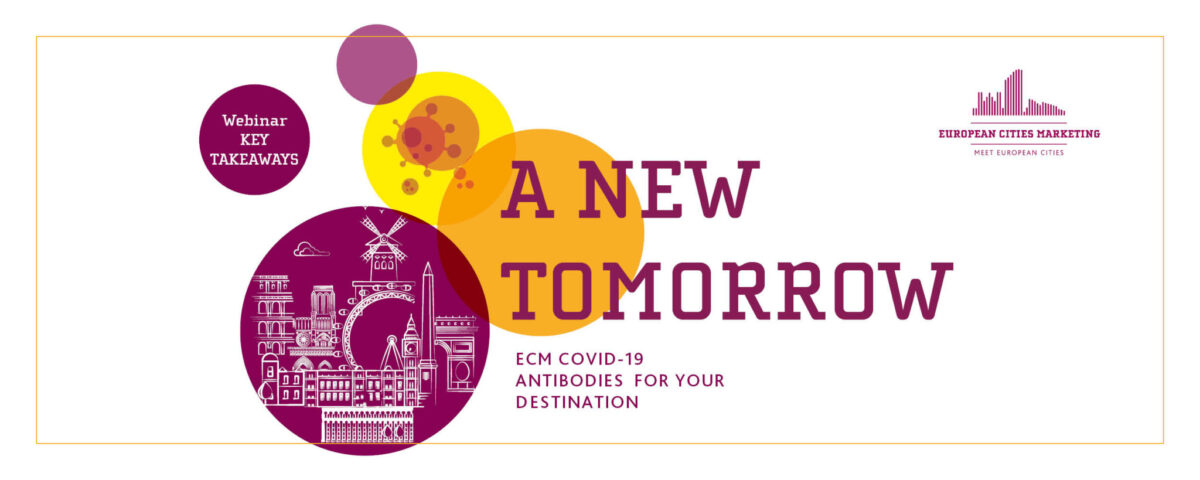Travel & Tourism in the aftermath

In a focused session, our ECM partners shared some of their newest insights and data to help us prepare and navigate the days which will come after this world-wide pandemic.
Feel free to (re)watch the webinar recording!
Guest speakers:
- The Trends in Data Point Towards a New Tomorrow, by Olivier Ponti, Vice President Insights, ForwardKeys
In this presentation, Olivier Ponti shared his latest data on airplane traffic and explored what the data can tell us about what comes next, in the end of the crisis. ForwardKeys captured data from flight searches, prior to the booking of the trip, to the seating capacity that airlines put on the market, to the actual bookings and the tickets that are issued to have the most complete, comprehensive data for direct and indirect bookings. The goal is to understand when people book, where they travel, what their itinerary looks like and how long they will stay in order to create algorithms to anticipate the future.
Key takeaways:
- Europe presents a 50% decrease of flight bookings compared to last year and it is the second most impacted region, behind Pacific Asia. According to the data, all parts of Europe are affected in a similar way. All cities have also registered a sharp decline (from 40 to 61% less bookings), with Italian cities having the worst rates.
- If we look at net bookings to Europe from outside, we can monitor the willingness to travel to Europe. Unfortunately, people are not booking European destinations and travelers who had already booked are cancelling their trips.
- There is no sign of recovery since the start of the crisis and no region is benefiting from the situation. We can expect to enter the recovery phase when destinations will be above the 100% decline, meaning there won’t be as many cancellations. We’ll also need a better seating capacity, because right now, the overall seating capacity in planes is just a fraction of what it was last year (less than 10%), with many airlines on the verge of bankruptcy.
- If we have a look at the coming months, especially the summer season, the booking situation looks bad, as we are between 50 and 65% behind last year. All is not lost however as there may be some delayed bookings and despite travel restrictions and quarantine, people are still searching for flights for the summer holidays (in Europe, for longer holidays and for long-haul flights) but they are not booking yet.
- Destination Marketing in the Era of Corona, by Evgenia Egorova, Social Lead at VisitNorway
Evgenia Egorova presented VisitNorway’s response to the COVID-19 crisis. She and her team were very quick to answer and put in place a new campaign, based on the 4 P’s of Marketing, Pause – Pull (Play) – Pivot – Push. They then developed a specific communication plan on social media during each phase of the crisis we are facing, with one question in mind: how to keep on inspiring travel during the time of crisis?
Key takeaways:
- A key action of the Pull & Play phase was an ongoing communication with the industry & advise them not to stop engaging with potential visitors.
- The red line of communication since mid-March is to keep this “dream” phase: “Dream now, Visit later” campaign (#dreamnowvisitlater)
- Showing support & sharing feel-good content and stories on social media is at the core of the campaign. For example, the “Visit Norway from home” challenges help to keep up the dialogue with followers. The edutainment content also enables people to visit the country virtually.
- The Pivot and Push actions will be deployed for Summer 2020 as they will focus on domestic market for the summer, with adapted and paid campaigns.
- Reinventing the Role of Tourist Information Centers, by Pablo Ortega Novillo, Catalonia Tourist Information Centers Manager and Chairperson of the TIC Knowledge Group
What have the TICs been doing now that cities have no tourists? How do they see their services moving forward, when the Coronavirus crisis is over? In his presentation, Pablo Ortega Novillo presented different initiatives that have been implemented by some ECM Tourist Information Centres. He also shared the results of a survey which goal was to evaluate the state of the TICs within the ECM TIC Knowledge Group.
Key takeaways:
- There is a common situation for all of the destinations, as the TICs are closed, there are no visitors & this situation brings very important economic challenges because there are no revenue (no city tax, no sells…)
- Some previous trends are becoming more obvious in the scope of the crisis, such as the domestic market focus, the need of a more sustainable tourism (use of other transportation, less brochures, …), and to bring the information directly where the visitors are. Those trends are compatible and should be developed together. The ECM members are already developing resourceful and innovative ideas (mobile TICs, virtual TICs, staff can help other departments, …).
- From their 2018-2021 Strategic Plan, the TIC of Catalonia will be developed as Tourist Information Service with a new flagship TIC, a new concept, a new location and alliance and a new philosophy: less visitors = more time per visitor = better experience.
- Catalonia post-crisis actions will focus on the promotion of proximity tourism and engagement with locals. They will offer their help and services to local SMEs and they plan on implementing virtual TICs.
Click below to rewatch the whole webinar!
Make sure you have a look at our next webinars here and receive our newsletters (for members only)